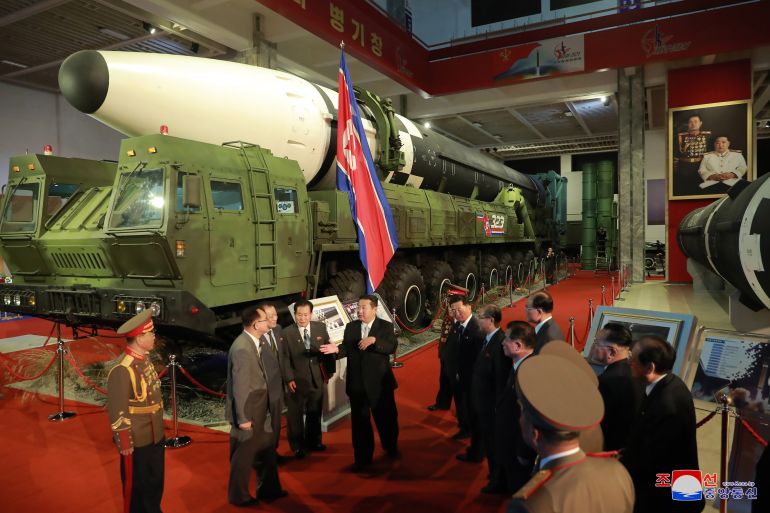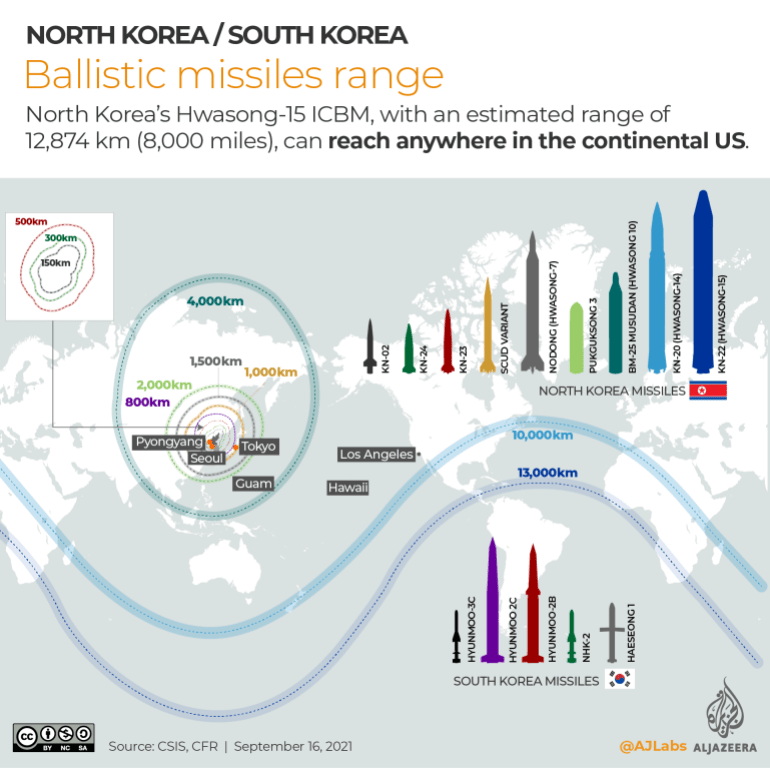N Korea test fires suspected submarine-launched ballistic missile
The launch comes as diplomats try to nudge Pyongyang back to the negotiating table over denuclearisation.

North Korea fired what appeared to be a submarine launched ballistic missile towards the sea off its eastern coast, South Korea’s military said, with Japan saying two missiles were launched.
One ballistic missile was launched at about 10:17am (01:17 GMT) on Tuesday from the vicinity of Sinpo, South Korea’s Joint Chiefs of Staff said.
Keep reading
list of 4 itemsN Korea’s Kim calls for improving lives amid ‘grim’ economy
North and South Korea restore hotline after Pyongyang tests
N Korea conducts second-known missile test in a week
North Korea has a submarine base as well as equipment for test-firing submarine-launched ballistic missiles (SLBMs) in the area and has previously launched other types of missiles from there.
“The intelligence authorities of South Korea and the United States are currently conducting a thorough analysis regarding additional details on the missile,” the JCS said in a text message to reporters, according to South Korea’s Yonhap news agency.
The National Security Council, which held a 70 minute meeting following the launch, expressed “deep regret” at the test.
In Japan, Prime Minister Fumio Kishida said that two ballistic missiles had been detected, the Reuters news agency reported.
Kishida described the North’s recent series of missile tests as “regrettable” as he returned to Tokyo to discuss the launch after cutting short his first day of campaigning for Japan’s general election.
The US military on Tuesday condemned North Korea for the launch and called on the country to “refrain from any further destabilising acts”.
“We are aware of the North Korean ballistic missile launch this morning into the Sea of Japan and are consulting closely with the Republic of Korea (ROK) and Japan,” the US Indo-Pacific Command said in a statement, adding that “this event does not pose an immediate threat to US personnel, territory, or that of our allies”.

North Korea has now carried out at least eight projectile launches this year, and last tested an SLBM in 2019. It is banned from carrying out ballistic missile tests under United Nations’ sanctions.
Officials from the United States and South Korea have been trying to encourage North Korea back to stalled negotiations on its banned weapons and nuclear programmes.
“We will seek diplomacy with the DPRK to make tangible progress that increases the security of the United States and our allies,” Sung Kim, the US special representative on North Korea, said in a statement following talks with his South Korean counterpart in Washington on Monday.
Intelligence chiefs from the US, South Korea, and Japan are due to meet in Seoul on Tuesday to discuss the situation in North Korea, according to South Korea’s Yonhap news agency.
The US Indo-Pacific Command urged the North to refrain from “further destabilizing acts” but said Tuesday’s launch posed no immediate risk to the US or its allies.
Coercive diplomacy
Negotiations on dismantling the North’s banned nuclear programme have been stalled since February 2019 when a summit in Vietnam between then-US President Donald Trump and the North’s leader Kim Jong Un collapsed.
A later meeting between the two men at the demilitarised zone between the two Koreas failed to make any headway.

Since then, Pyongyang has stepped up weapons testing – a move Kim has said is necessary for his country’s “self-defence” – showing off new developments in missile technology and stepping up activity at its Yongbyon nuclear complex.
“It really illustrates very vividly the extent to which North Korea is willing to do almost anything it can to make sure it has as powerful a deterrence as possible and to make sure the regime is able to survive in the face of what it sees as a ‘hostile’ US policy,” Benoit Hardy-Chartrand, an adjunct professor of political science and international affairs at Temple University in Japan, told Al Jazeera.
Pyongyang’s recent weapons tests include what it has said was a hypersonic missile, and a cruise missile with nuclear capability, although last week it again held out the prospect of a resumption in diplomacy if Seoul dropped what it called “double standards”.
“North Korea is trying to coerce the world into accepting its violations of UN Security Council Resolutions as if they are normal acts of self-defense,” Leif-Eric Easley, a professor at Ewha University in Seoul, said in an emailed response to the launch.
“This is part of the Kim regime’s efforts to achieve de facto international recognition as a nuclear power and receive concessions just for resuming contact.”
South Korea has also been stepping up military modernisation, with Seoul testing its first SLBM last month, and developing new military equipment such as aircraft carriers and upgrading its air force capabilities with American-made F-35 stealth fighters. It is planning its first space launch later this week.

Despite the arms build-up, and flurry of tests, the two Koreas earlier this month restored a communication hotline just over two months after Pyongyang suddenly stopped picking up Seoul’s calls.
The move was an attempt to establish “lasting peace” on the peninsula, the state-run KCNA news agency quoted Kim as saying at the time.
North Korea is also struggling with the effect of prolonged border closures imposed because of the COVID-19 pandemic, which have exacerbated the effect of international sanctions.
At the 76th anniversary of the founding of the ruling Workers’ Party of Korea last weekend, Kim called on officials to do more to improve the lives of the country’s citizens given the “grim” economic situation.
The country marked the anniversary with art performances, galas and a fireworks show, but did not stage any large military parades.